Hong Kong – The 29th CACCI Conference in Hong Kong, Asia Beyond Limits, also featured a series of breakout session focused on different Product and Service Councils.
This year’s program was designed to make the Hong Kong gathering another occasion for CACCI members to discuss current sectoral issues As in previous years, parallel break-out sessions on sectors of interest to members were organized. Each of the sessions featured panelists who shared their views on trends and developments, problems and issues, and prospects for growth in the sectors concerned. There were discussions on activities that CACCI members can undertake to further strengthen business ties among themselves.
The breakout sessions were organized by the following CACCI Product and Service Councils:
- Asian Council on Trade Facilitation/Trade Generation
- CACCI Women Entrepreneurs Council
- Asian Council on Tourism
- Asian Council on Water, Energy and Environment
Young Entrepreneurs Group of Asia Pacific - Asian Council on Food and Agriculture
- SME Development Council
- Asian ICT Council
- The Asian Council on Health and Education
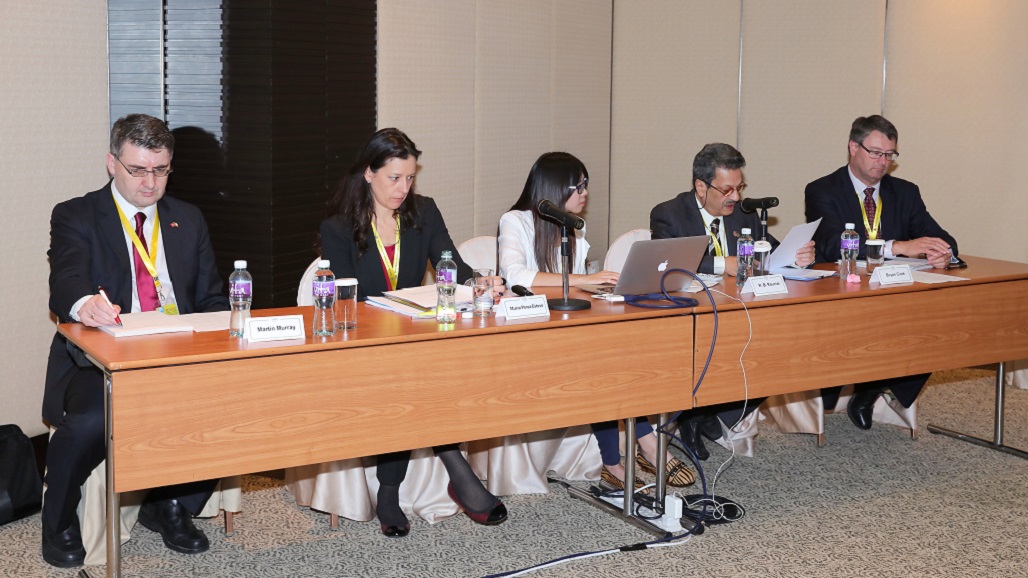
Mr. R. B. Rauniar, Chairperson of the Asian Council on Trade Facilitation from Nepal, reported on the following highlights of the breakout session on trade facilitation:
In his Opening Remarks as session chairman, Mr. Rauniar reported on recent developments with regard to activities of multilateral organizations (e.g., ADB, PECC, ICC, and the WTO, among others) in promoting trade facilitation in the region and beyond. He also outlined the potential cost reduction that countries are expected to experience from the implementation of the Trade Facilitation Agreement (TFA).
Ms. Maria Peres-Esteve, Counsellor, Council and TNC Division, World Trade Organization from Geneva provided the latest updates on the TFA. She reported that 51 member countries out of the 161 WTO members have ratified the TFA, adding that the ATF could be enforced only when two-thirds of the member countries ratify the agreement. She also highlighted the major WTO activities to improve world trade.
Mr. Bryan Clark, Director, Trade and International Affairs, Australian Chamber of Commerce and Industry elaborated on practical issues and impediments to cross-border trade. He suggested that local governments must act to streamline the procedures and simplify necessary policies for traders. These include those pertaining to visa regime, infrastructure de-velopment, transport connectivity, and availability of information about trading countries, among others.
Mr. Martin Murray, Executive Director, Asia Matters from Ireland, reported that EU countries trade mainly among themselves, with only 10% trading with Asia. The same can be said in Asia; Asian countries trade within the Asian region. This means there is a great potential for strong EU-Asia business relations, Mr. Murray concluded.
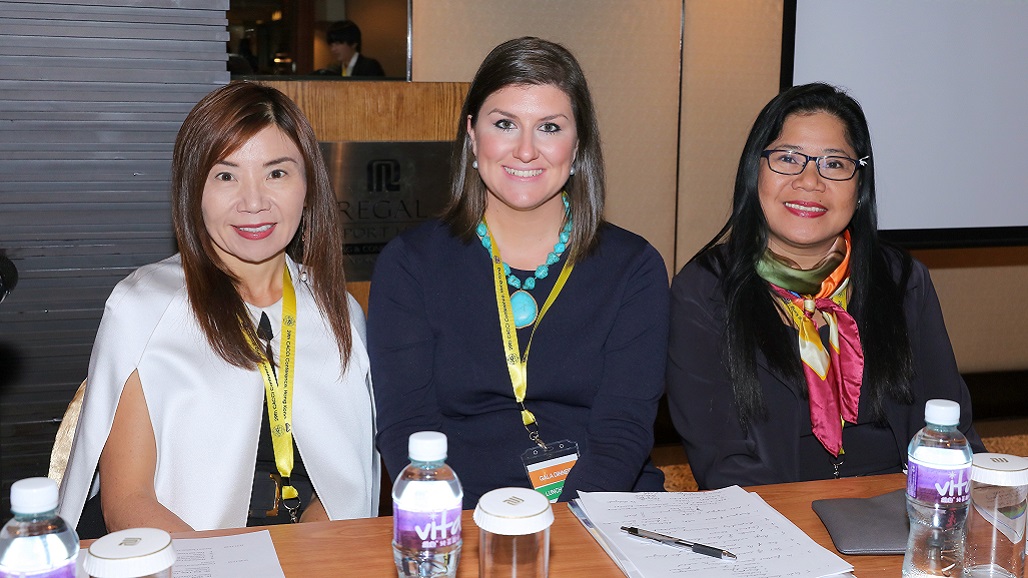
Ms. Selima Ahmad, President of Bangladesh Chamber of Commerce and Industry and Vice Chairperson of Nito-Niloy Group from Bangladesh reported that the breakout session, which she chaired. featured five panelists. The panelists included: Ms. Esther Ma from the Golden Bauhinia Women Entrepreneurs Association from Hong Kong; Mrs. Teresita Yujuico, Chairperson, lstana Foundation from the Philippines; Dr. Imogen Reid, Senior Adviser, Trade and International Affairs, Australian CCI and Program Manager, IPRA Women’s Economic Development; Dr. Maria Socorro Malitao, President and CEO, Standout Group of Companies from the Philippines; and Ms. Eva Chu, Founder and Managing Director of Etin HK Ltd., and Vice Chairperson of the HK General Chamber of Young Entrepreneurs.
Ms. Ahmad said that the panel discussion raised a number of points, including the following:
(a) Policy advocacy is important for the growth of women entrepreneurs
(b) Women’s business organizations can play an important role in supporting and supporting the growth of women in business. Capacity building in these organizations are therefore very important.
(c) Women entrepreneurship should be discussed during a plenary session of future CACCI Conferences, instead of during breakout sessions.
(d) The CACCI website should create links to women entrepreneurs, with information on their activities and their products.
(e) Taking into account that mentorship is important, CACCI should consider introducing a mentoring forum for women entrepreneurs and for entrepreneurs in general.
(f) A strategy should be developed aimed at increasing women’s participation in the economic arena in line with the Sustainable Development Goals.
(g) CACCI should consider identifying and formulating a Women’s Business Agenda for its members.
(h) Considering that cross-border trade and export of products made by women entrepreneurs, it is important for CACCI to determine how women entrepreneurs can fit into the value chain process.
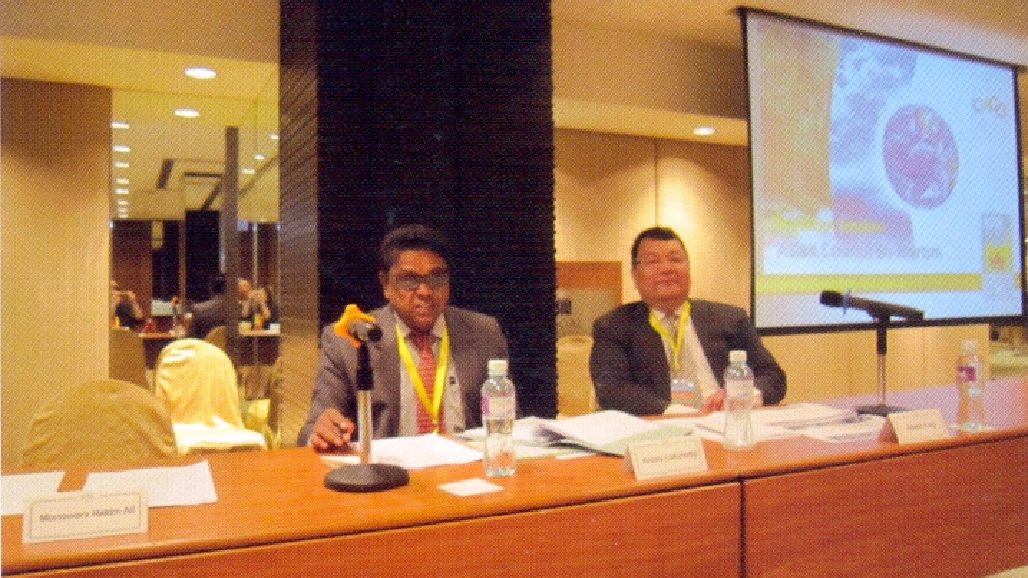
Mr. Anura Lokuhetty, Chairman of the CACCI Asian Council on Tourism from Sri Lanka, reported that the breakout session on tourism had a good interaction and exchange of views on how to promote regional cooperation in the tourism sector.
Mr. Lokuhetty said he presented a report on world tourism, its continuous growth over the last few decades, and prospects for future growth. Growth in leading countries were analyzed in terms of tourism receipts and arrivals and how these would improve in the next 10 years. He also spoke on the important role played by tourism in the economies of many countries and its multiplier effect; how the decline in oil prices is expected to help increase disposable income of people resulting in more travel. He also analyzed the mode of transportation and purpose of visit.
Mr. Lokuhetty further reported that the discussions also focused on the role of tourism in many Asian countries, particularly in creating employment opportunities; on the initiatives taken by many countries in the region; the growth of the sector in various Asian countries in terms of arrivals, tourism receipts, employment generation, and other multiplier effects; and the potential of the region to dominate world tourism.
Mr. Lokuhetty then focused on Sri Lanka and the growth of its tourism sector since the end of the internal conflict in 2009. He pointed out the role played by the tourism sector in the economic recovery and development efforts of the country, citing the various government initiatives to provide investors with incentives and investment opportunities in various sub-sectors of the tourism industry.
The other speaker was Mr. Joseph Yung, Vice President—China, Group Project and Development, Regal Hotels International from Hong Kong, who shared the hotel group’s vision and future investment plans. He also provided a very descriptive information on the Chinese travelers and their expectations from host countries, which was considered a very timely topic as many countries in the world are extremely interested about attracting Chinese travelers, given that China is the largest out-bound market and with the largest population in the world.
As regards the activities of the CACCI Asian Council on Tourism, the session discussed the importance of publishing a bi-annual newsletter and requested more CACCI members countries to provide articles on relevant topics that can be shared with other members. Mr. Lokuhetty also suggested the need to invite hotel training institutions and other tourism sector stakeholders (such as airline operators, travel agents, transport providers, etc.) to attend the tourism sessions organized during CACCI Conferences. This will help them to improve their knowledge about the tourism industry of the region as well as attract more young people to the industry. He also underscored the need to expand the labour force in tourism to meet future demand.
In addition, Mr. Lokuhetty proposed the discussion on tourism as a Plenary session since most tourism is a major foreign exchange earner for many CACCI member countries and one of the fastest growing industries in the world.
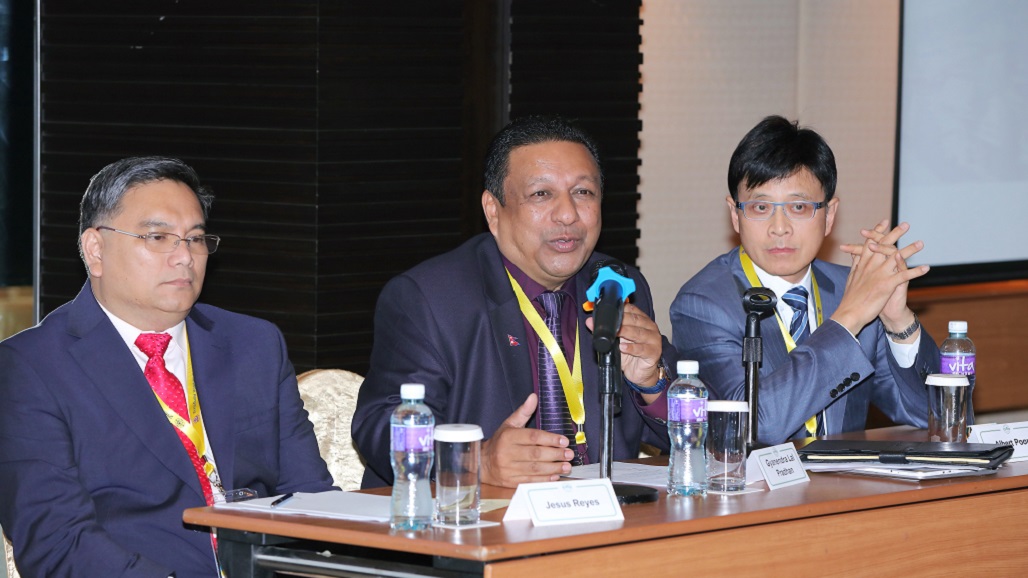
Mr. Gyanendra Lal Pradhan, Chairman of the Asian Council on Water, Energy and Environment (ACWEE) from Nepal, who chaired and moderated the session, reported that the program kicked off with his opening remarks and brief acknowledgment of the participants. This was followed by theme paper presentation by Mr. Pradhan.
Mr. Pradhan in his theme paper presentation provided a snapshot of the energy scenario in the Asia Pacific countries. Appraising Asia Pacific as a rich region in natural resources, he pointed out the region’s vulnerability to the negative effects of climate change and environmental calamities. He emphasized the need to recognize the fact that most of the environmental issues of the Asia Pacific region are inextricably linked, and working to ameliorate one will often have added benefits for the others. He advocated for collaborative approaches to effective resource allocation and management in order to minimize environmental costs and reiterated the need to provide incentives to businesses and local communities to achieve sustainable use of resources.
Mr. Pradhan’s presentation was followed by presentations on topics covering environmental sustainability in the region by selected key speakers from CACCI member countries. The key speakers included Mr. Albert Poon, Rotary Water Project from Hong Kong and Mr. Jesus G. Reyes, Assistant Vice President, Nestle Philippines Inc. and Co-Chair, PCCI Environment Committee.
Mr. Poon shared his experiences on a number of water service projects in China and presented on how techniques such as rain water harvesting can help provide an independent water supply to supplement the main supply during water restrictions or in areas of water deficiencies. He emphasized on the application of rainwater harvesting in urban water system to provide a substantial benefit for both water supply and waste water subsystems by reducing the need for clean water in water distribution system. He emphasized on the need to explore water resources for communities citing examples of rotary projects that have provided clean drinking water to schools.
Mr. Reyes presented the issues of environmental sustainability drawing experiences of Philippine businesses. He also presented his views on the experience and policies of the Philippines with respect to climate change and mitigating its impacts on the environment and on business.
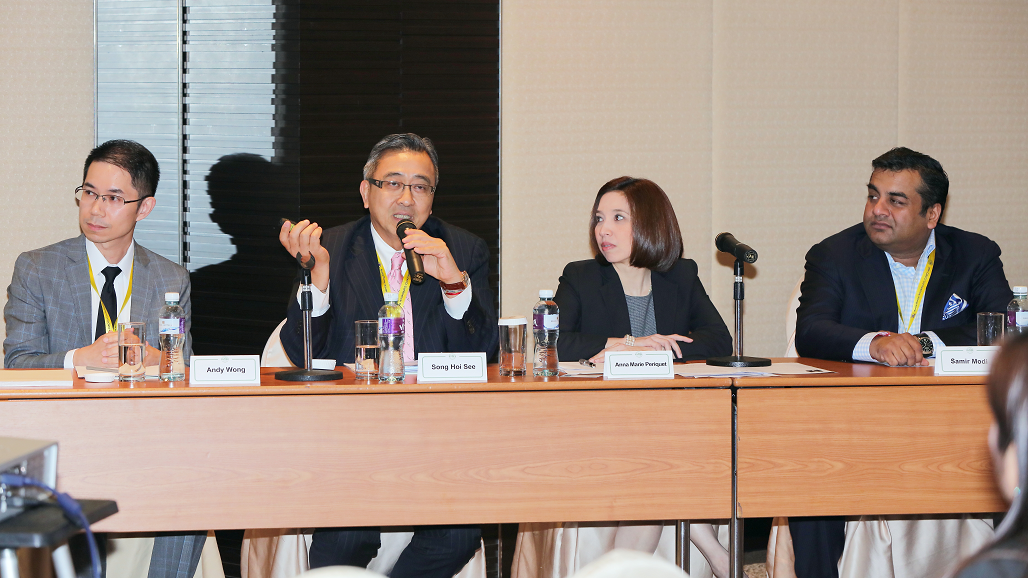
Ms. Anna Marie Periquet, Chairperson of the Young Entrepreneurs Group of Asia Pacific (YEGAP from the Philippines, welcomed the participants and expressed her appreciation for the continued support of the CACCI to the YEGAP. She also thanked the Kowloon Chamber of Commerce for hosting the 29th CACCI Conference. She reiterated the Young Entrepreneurs Group of Asia Pacific will continue to serve its members and affiliates by providing them with advocacy, networking activities and entrepreneurial undertakings in the region.
Ms. Periquet reported that more young entrepreneurs and start-up businesses are taking an active role in the Asia-Pacific region today. The creation of ministries of entrepreneurship by various governments is proof that there is an increase in the number of entrepreneurs doing business in the region. Further, YEGAP members and affiliates have increased significantly in the last years.
Ms. Periquet added that the promotion and development of the entrepreneurship movement, particularly youth entrepreneurship, helped transform the Asia-Pacific economy to one that is vibrant, competitive and integrated to the world market. The youth entrepreneurship movement has become widespread in Asia- Pacific, as the private sector has envisioned an agenda and plan of action for the purpose of encouraging more entrepreneurs to thrive.
Ms. Periquet stated that the region needs to adopt a common agenda that unleashes the entrepreneurial spirit among the youth to include Entrepreneurship Education; Credit Assistance and Lending; Role Modeling and Mentoring; Business Plan Development and Training; Market Syndication and Linkage; and Business Information Network.
Ms. Periquet concluded by saying that the YEGAP will continue to pin its hopes on the strength of entrepreneurs whose diverse enterprises continue to serve as the anchor to business and economy; and the YEGAP will continue to serve as an effective venue to implement suitable programs that are available to young entrepreneurs in the region.
Mr. Samir Modi, Senior Vice President, CACCI and Executive , Director, K. K. Modi Group from India, shared his business experience and practices as Executive Director of the K. K. Modi Group, as well as in his numerous business undertakings, namely: Godfrey Phillips India Limited; Indofil Industries Limited; Twenty Four Seven Convenience Stores; Colorbar Cosmetics Private Limited; Modicare Private Limited.
Mr. Modi is recognized in India for his business acumen in turning around brands, products and corporations into profitable business ventures. He is also credited as the brains behind India’s first of its kind 24-hour convenience store.
Mr. Modi described himself as an “unorthodox and rebellious” entrepreneur. He stated that a true entrepreneur has the “guts” and courage to believe in something and take it in; focuses on good products; goes with his heart and mind; takes the risk and takes the belief; and invests in research and development. He added that an entrepreneur is one who charts his own destiny.
Mr. Song Hoi See, Founder & CEO, Plaza Premium Lounge Management Limited from Hong Kong, has made a huge impact in Hong Kong’s airport industry as the Founder and Chief Executive Officer of Plaza Premium Lounge Management Limited. All it took for him to transform the airport industry of Hong Kong and to establish the world’s first Airport Pay-in Lounge at the Hong Kong International Airport was to experience losing his airport lounge privileges when he started flying economy class. Mr. Song shared that the most successful entrepreneurs are those who turn challenges and trials into windows of opportunities.
At present, Mr. Song’s company operates in more than 130 locations in 35 international airports and counts over 2,500 employees. He shared that the resounding success of Plaza Premiere Lounge’s business model has prompted airport authorities from around the world to open their doors and welcome the Pay-in Lounge facility and value-added airport services in their respective airports to enhance the overall traveler experience.
Mr, Song stated that entrepreneurs must possess an entrepreneurial spirit, entrepreneurial abilities and must practice entrepreneurship by forging alliances with other entrepreneurs or organizations advocating entrepreneurship.
Dr. Andy Wong, Assistant Dean, Chinese University of Hong Kong Business School, shared that prior to his pursuit of an academic career, he was an awardwinning creative director at major ad agencies. During his tenure as a creative director, he has won over 60 awards which were conferred by local and international award shows including the HK4As, Asian Advertising Awards, the London Advertising Festival and the New York Festivals.
Dr. Wong shared his vast expertise in consumers’ perception of knowledge, stereotypes, marketing and the use of consumption language in entrepreneurship.
He reminded all entrepreneurs to prepare for mistakes because mistakes prompt innovation. One must learn from mistakes. With bad experiences, business windows open. He enumerated the components to successful entrepreneurship: Teamwork, Innovation, and Excellent Service. The culture that an entrepreneur must promote in one’s company is to “be the best”. He also stated that success is a journey and not a destination. Success is not measured by money. Dr. Wong concluded his presentation by sharing his food for thought for entrepreneurs: (1) persistence and perseverance; (2) do not walk away from crisis; (3) lead by example.
The open forum was dynamic and participated in by the participants. Discussion focused on YEGAP activities, including the following:
(a) Membership Expansion and Networking: The YEGAP welcomed new members: Kowloon Young Entrepreneurs Group and the Chinese University of Hong Kong Business School.
(b) 6th Asia Pacific Young Entrepreneurs Award:- Ms. Periquet announced that submission of nominations to the 6th Asia Pacific Young Entrepreneurs Award would begin on January 2016.
(c) Publication of the Next Editions of YEGAP Newsletter: The YEGAP is now in the process of putting together the 14th edition of the newsletter. Chamber members are invited to submit articles for the newsletter.
(d) Inputs for the YEGAP Website: The YEGAP website is continuously being managed by the YEGAP secretariat. Presentations and proceeding of the 2015 YEGAP Breakout Session will be uploaded to the website.
(e) Date and Venue of Next Meeting Session: The next YEGAP meeting will be held in Taipei, Taiwan, R.O.C. In 2016 in conjunction with the 30th CACCI Conference.
In her concluding remarks, Ms. Periquet acknowledged the participants for attending the YEGAP breakout session and invited them to the 2016 YEGAP meeting in Taipei. She thanked, once again, the Kowloon Chamber of Commerce and Industry for hosting the YEGAP meeting.
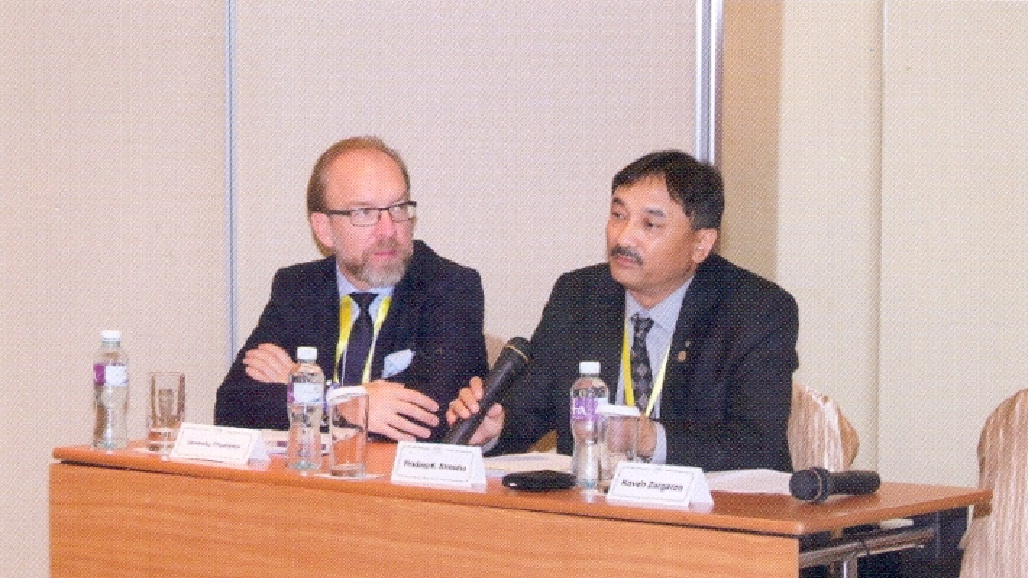
Mr. Pradeep Kumar Shrestha, CACCI Vice President and Former President of the Federation of Nepalese Chambers of Commerce and Industry (FNCCI), reported that he chaired the breakout session on food and agriculture on behalf of the Asian Council on Food and Agriculture (ACFA) Chairman Mr. Samantha Ranatunga from Sri Lanka. He noted that the session featured himself as well as Mr. Gennadiy Chyzhykov, President, Ukranian Chamber of Commerce and Industry, as speakers.
Mr. Shrestha’s presentation fcused on “Ensuring Food Security and Food Safety in the Region.” Citing a report entitled “Undernourishment Around the World in 2015” released by the Food and Agriculture Organization of the U.N., he pointed out that today’s challenges is to ensure adequate food supply to sustain the growing population which is expected to reach 9 billion people by the year 2050. He pointed out that today, one in every nine persons remains undernourished globally and mainly living in the developing countries, adding that no country in the world is self-sufficient in everything so shifting from dependency to interdependency would help to sustain balance growth among the member countries of CACCI.
Stressing that we are born to live and not to exist only, Mr. Shrestha said that statistics show food grown in the world is sufficient to feed the total world population if we are able to control waste and manage proper distribution. Adoption of right technology in agriculture and storage would address much of our needs. Commitment in implementation of good government policy by the political leaders backed by the hard work of farmers would bring visible change in this field and no human being would die out of hunger.
For his part, Ukraine Chamber of Commerce and Industry President Mr. Gennadiy Chyzhykov, Mr. Chyzhykov introduced to the participants the history of the agriculture sector in Ukraine, which he said is referred to as the “Bread Basket of Europe,” as well as the latest development in the country’s food sector. By attending the CACCI Conference and the Breakout Session, Mr. Chyzhykov expressed his hope that CACCI member countries will get a further understanding of Ukraine, and the two sides will be able to forge cooperation ties in the future, especially in the agriculture field.
The session speakers identified the four elements of food security as food availability, food access, utilization and stability, and that major sources of food insecurity are production and productivity, consumption, distribution, environment, technology, and geography. The speakers also called on all CACCI member countries to share their respective potential and surplus product and develop a common information center to address food crises in any circumstances, adding that knowledge bank and food bank would be the solution to the present crisis.
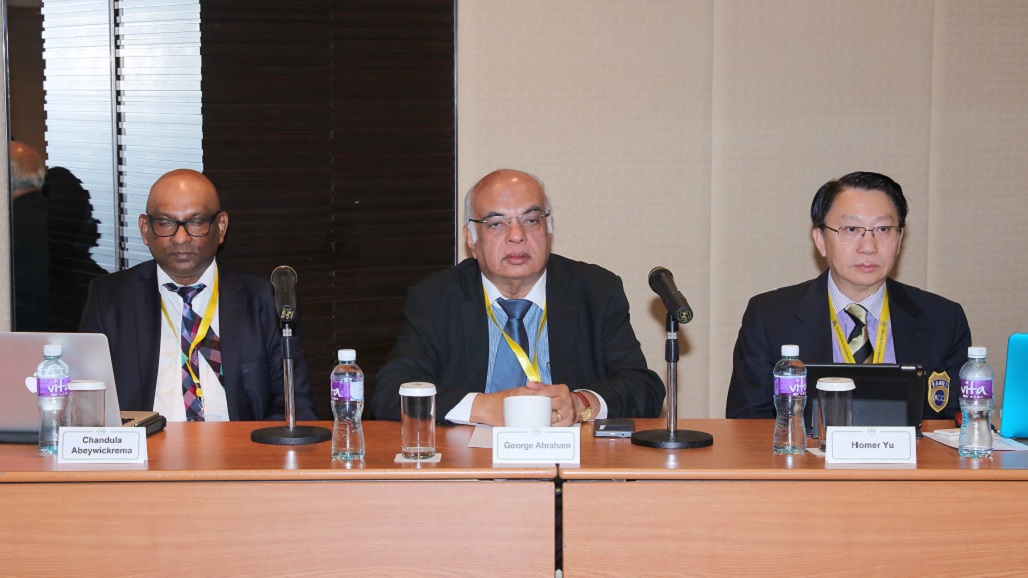
Mr. George Abraham, Chairman of the SME Development Council (SMEDC) from Singapore, reported that he began the session by briefing the participants on the SMEDC and its activities. Mr. Abraham’s introductory remarks was followed by the presentation of Mr. Homer Yu, Secretary, Business Affairs Department, Kowloon Chamber of Commerce. Mr. Homer Yu spoke on the SMEs in Hong Kong and the challenges faced by them. These included the following:
Financing of SMEs which found it difficult to obtain bank loans and therefore had to depend on their own and family resources for financing.
Lack of qualified staff with minimal management experience made administration difficult.
Market for products were adversely affected by the changing economic scenario.
The Hong Kong government in difficult times assisted with reduction in electricity bills, stamp duties and some forms of grants for market development and participation in exhibitions. However, the paperwork involved is time-consuming.
For the SMEs it was always a continuous learning experience.
The second speaker, Mr. Chandula Abeywickrema of Managing Director/CEO of CCC Solutions Pvt. Ltd from Sri Lanka addressed the need for promoting growth of SMEs in the region:
In relation to finance for SMEs, he suggested capacity building for sustainable enterprise creation in Asia through an inclusive SME strategy and role of business and stake holder chambers.
He spoke of the problem of defining SMEs as to whether they were ‘microsmall’, ‘small-small’, ‘small-medium’, ‘medium-medium’.
In relation to capacity building of SME entrepreneurs, he highlighted the role of business chambers and industry associations, partnership between SMEs and SMPs (Small & Medium Practitioners) and linkages to Supply and Value Chain for sustainable business models.
With regard to financial services solutions for SMEs, he spoke of the problems of the availability, accessibility and affordability of finance.
He highlighted the important role of business and industry chambers in policy advocacy, lobbying for SME friendly regulatory framework, assistance with commercializing the entrepreneurial ideas of SMEs.
He further elaborated on the role of regional banks and finance institutions, development bank and commercial banks in the financing of SMEs.
He recommended making SMEs the backbone of economic development by enhancing through capacity building, empowering through commercialization and enriching SMEs through creation access to services, finance and markets.
Chairman Mr. George Abraham then addressed the meeting with an overview of SMEs in the Asia Pacific region. Using country examples, he pointed out that 97% of enterprises are SMEs and in every country they account for a significant portion of employment. However, the economic contribution of SMEs varied among the CACCI countries and the SME export value as a share of total export value also varied. However, it also provided opportunities for growth. He then briefed the meeting on ASEAN’s strategic action plan for SME development which clearly defined the mission, objectives, guiding principles, current status, and future policies and programmes for ASEAN SME Development.
Mr. Abraham pointed out that the plan had specific goals with regard to access to finance, market and internationalization strategy, human resource development (HRD), information and advisory services, technology and innovation. He stressed the importance of a plan of action for CACCI countries which included a working relationship between the private and government sectors. He summarized the action plan for CACCI as follows:
(a) Working with the Private Sector through:
* SME entrepreneurship and human resource development.
* SME capacity building (management, marketing, supply chain, network, ICT).
(b) Working with the government Sector through:
* Greater collaboration with government ministries, statutory boards, sectoral bodies and agencies.
* Public-private sector engagement for SME development and linkages with the regional and global production network.
In order to highlight the importance of private and government sector relationship in SME development, he gave examples of Singapore companies benefiting from programmes initiated by the Government of Singapore through its agency SPRING Singapore. He gave the examples of:
(a) Spring Startup Enterprise Development Scheme (SPRING SEEDS): Co- invests in start-ups with third-party investors (Business Angel Scheme, SPRING Startup Enterprise Development Scheme, Sector Specific Accelerator Program).
(b) Ace Start-Up Grant: Provides funding support to entrepreneurial Singaporeans who want to take their first step in starting up differentiated business. The four key evaluation criteria include: differentiation, business model feasibility, potential market opportunity, and management team.
(c) Technology Commercialization Scheme (TECS): Aims to catalyze the formation and growth of such start-ups based on strong technology, intellectual property and a scalable business model. SPRING provides early stage funding to successful applicants to fund such development efforts towards the commercialization of proprietary technology solutions.
The discussion that followed brought out the following points:
(a) It was felt that there was a need for new companies to promote their goods and services. In this regard, Kowloon Chamber offered free exhibition space and facilities for CACCI members to participate in an exhibition for SMEs.
(b) There was a need for training programmes for SME Development and Bangladesh requested CACCI to help with a training programme for this purpose.
(c) The delegates from Tajikistan and Papua New Guinea also requested CACCI’s assistance in a training programme for SME development.
(d) The meeting accepted the proposed ‘4 CACCI strategic thrusts’ and unanimously agreed to follow up on the Chairman’s proposal and report progress at the next meeting.
In his concluding remarks, Mr. Abraham requested CACCI members present to provide relevant information on SMEs and their countries for the CACCI SMEDC newsletter and wherever possible, highlight success stories that could be used as role models.
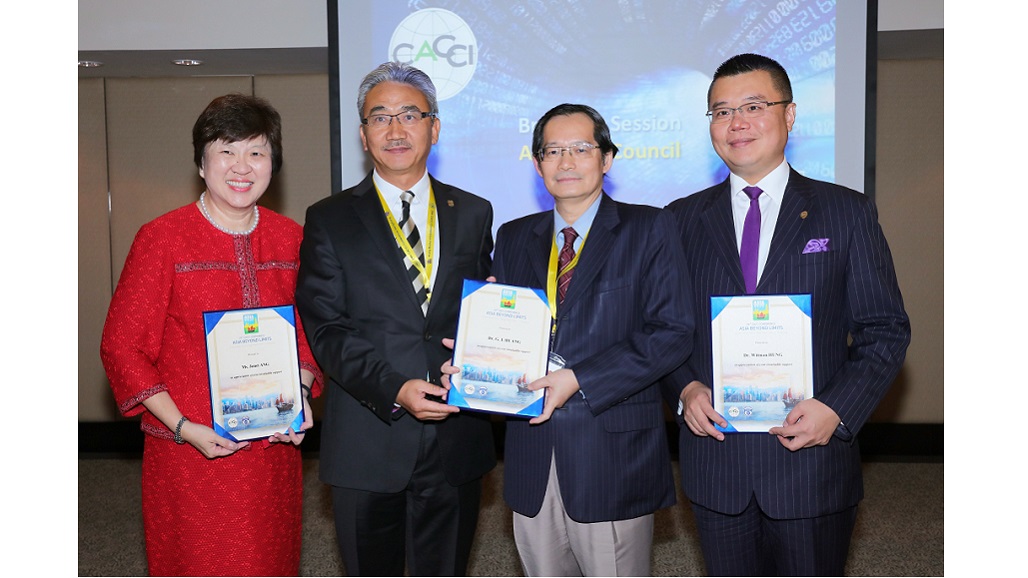
Dr. G. J. Huang, Chairman of the Asian ICT Council from Taiwan, moderated the break out session on ICT, which featured two other speakers. Dr. Huang began the session with his presentation on the topic “The Next Big Things in ICT” in which he identified future trends in ICT, namely, (a) the Internet of Things; (b) Smart Cities; (c) E-
Health; (d) Cloud Computing; (e) Big Data; (f) and Augmented Reality.
Ms. Janet Ang, Vice President, Smarter Cities at IBM Asia Pacific from Singapore, made a presentation on the topic “Cognitive Business”. She said that, with the view to bringing the “new technologies” to an extensive experienced based on core systems, IBM – which she noted manages some 70% of the world’s business data — launched its Smarter Planet initiative in 2008 that aims at making the world instrumented, interconnected and intelligent.
Since 2010, IBM has deployed 700 top experts to 116 cities around the world in Smarter Cities Challenge program. According to Ms. Ang, cities around the world are innovating to meet increasing expectations of their citizens, particularly in areas such as government and agency administration, city planning and operations, buildings, energy, water, transportation, education, smarter care, social programs, and public safety.
Dr. Witman Hung, President of iPro and Co-founder of Next Horizon Company from Hong Kong, focused his presentation on Opportunities for Young Entrepreneurs in Qianhai, China, which is considered a unique innovation hub for global enterprises, particularly those engaged in modern service industry sectors.
Dr. Hung noted that Qianhai currently fosters 200 innovative start-up companies with potential in technology, information service, cultural and creatives, and modern logistics. It also partners with famous incubators and professional associations and provides one-stop entrepreneurial support, comprehensive facilities and rent relief. Its activities focus on intelligent hardware, mobile Internet, e-commerce, big data, animation, movies, new media, 3D printing, virtual reality, new energy, and new materials, among others.
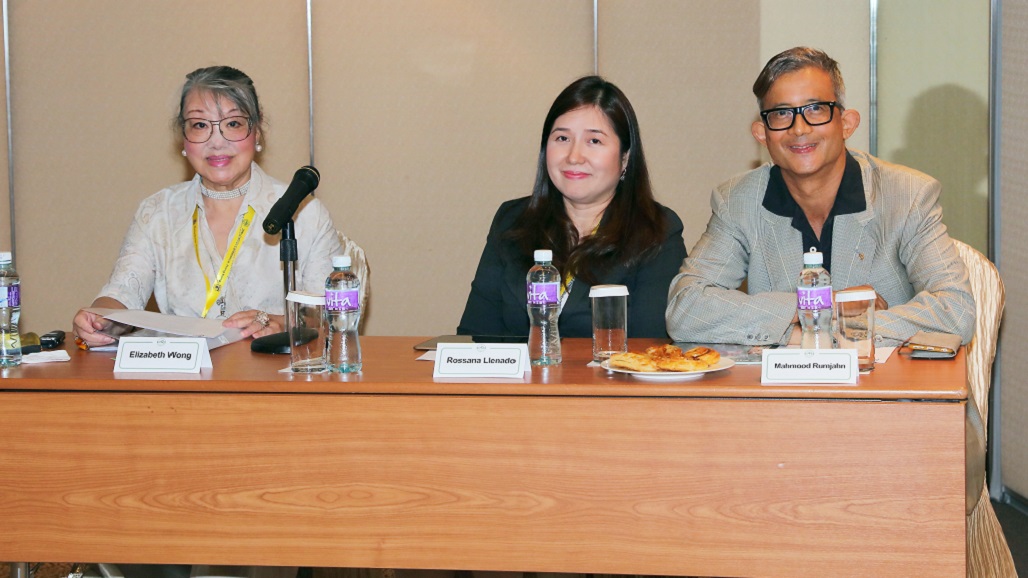
Dr. Seyed Hassan Tabatabaei Nejad, Chairman of the Asian Council on Health and Education from Iran, moderated the breakout session on health and education, which featured three panelists.
Ms. Elizabeth Wong, Writer, Former Director of Social Welfare and Former Secretary for Health and Welfare of Hong Kong SAR, shared her thoughts on health and education. She defined health as a state of social, mental and physical well-being which correlates with personal satisfaction. According to her, the key determinants of health are social, economic, physical, lifestyle, and behavioral environments, and that the key factors related to health are genetics, culture, education and biomedical factors.
On the other hand, she defined education as the process of learning to gain knowledge, skills, values, and beliefs. It is transferred through story telling, discussion, formal teaching, training, and research. Ms. Wong concluded her presentation by saying that health and education are interlinked; one cannot exist without the other. One’s health is not only linked to ones’ own education but the education of other people on whom one depends to survive.
Ms. Rossana Llenado, President of AHEAD Online from the Philippines, talked about how she started her work in the field of education, what motivated her to go into this field, what were the challenges she encountered along the way and how she overcame them, why she thinks education is vital for the economic development of a nation, and how she foresees the business of education will develop in the future (e.g., online tutorials).
She also outlined some of the activities undertaken by her company to promote education in the country — e.g., review programs for college and professional exams, business English program for executives, training for teachers and employees, among others. She also cited some of the competitive advantages of the Philippines in the filed of education — e.g. good teachers which are in demand all over the world; the friendly, happy and caring nature of the Filipinos.
Mr. Mahmood Rumjahn, Founder and Chief Executive Officer of MnS Music from Hong Kong, examined strategies for implementing regional cooperation in education, taking into account the not only the cultural and religious characteristics across countries but also the differences in their levels of economic development.
With no further comments, the CACCI Council, on motion duly seconded, endorsed the reports of the various breakout sessions as presented by their respective chairmen and moderators.





